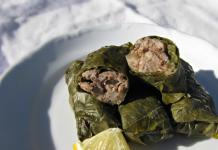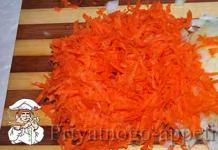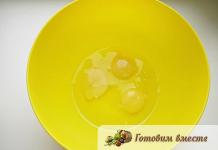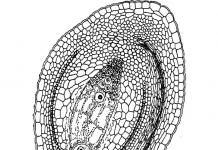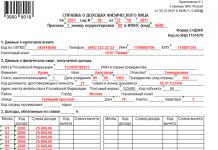The medicinal properties and contraindications of motherwort are well known to people far from medicine. Everyone knows that this is an effective remedy for “nerves” and insomnia. However, the herb has a number of other beneficial properties. It is actively used as a cardiotonic, restorative, antispasmodic, anticonvulsant, and diuretic. Motherwort takes pride of place in the state pharmacopoeia of Russia, belongs to the group of sedative, hypotensive medicines.
Features of motherwort
Where does motherwort grow and what does it look like? What are medicinal properties motherwort herbs and contraindications? How to prepare it correctly medicinal plant? What side effects can it have?
Motherwort five-lobed (hairy).  Motherwort cordial (common).
Motherwort cordial (common).  Blue motherwort.
Blue motherwort.
Species
What does a motherwort plant look like? There are about 25 species of this perennial herbaceous plant. Of these, only three species are used for medicinal purposes. These species are similar in morphological structure and beneficial properties.

Most often in pharmacology, motherwort five-lobed and cordial are used, and the gray one is better known in folk medicine. Both the five-lobed and hearty motherwort bloom all summer, and the glaucous one only in June-July.
Area
All three species belong to ruderal (weed) plants. They are able to quickly capture free resource areas and form thickets. They like to grow near roads and homes, in gardens, weedy places, sparse forests, in wastelands, in ravines, ravines, on cliffs and slopes, abandoned quarries and railway embankments, pastures and pastures, and are less commonly found along river banks. The grass loves sandy, clay soils enriched with nitrogen. Widely distributed in Central and Eastern Europe, Belarus, Ukraine, Central Asia, Western and Eastern Siberia, China, Mongolia, and the Caucasus. How an alien plant has taken root well in North America. The range of the gray motherwort is somewhat limited; it can most often be seen in the European part of Russia, in the southern regions.
Collection and preparation
- Time and method of collection. It is better to collect the grass during the period of full flowering, when the flower petals fully open. Most often this happens in July. Side shoots are cut with knives or scissors along with a stem up to 40 cm long. Collection is recommended only in dry, clear weather.
- Drying. The grass is laid out in a thin layer and turned often. Dry in natural conditions, with access to fresh air, but without direct sunlight. The readiness of the raw material is indicated by its fragility and fragility.
- Storage . The grass is packaged in linen bags or wooden boxes and protected from dampness. Store for no more than 3 years.

Healing effect
What is the pharmacological action of motherwort?
- Antispasmodic.
- Calming.
- Sedative.
- Bactericidal.
- Anti-inflammatory.
- Diuretic.
- Expectorant.
- Cardiotonic.
- Hypotensive.
- Antipyretic.
- Wound healing.
- General strengthening.
Motherwort pentaloba has additional healing properties:
- hemostatic;
- anticonvulsant;
- astringent;
- regulating the menstrual cycle.
What is in the chemical composition of motherwort?
- Alkaloids (the main ones are stachydrine, leonurine, leonurinine).
- Flavonoids.
- Glycosides.
- Essential oil.
- Sahara.
- Tannins.
- Vitamins C, A.
- Bitterness.
Indications for use
What does motherwort treat? For what diseases and symptoms is it most effective?
- Central nervous system. The herb helps with insomnia, neuroses, hysteria, increased anxiety, attacks of fear and panic, relieves headaches and neuralgic pain. Even valerian is not inferior in its effect on the central nervous system. The herb can also be prescribed for complex treatment epilepsy, seizures, paralysis.
- Cardiovascular system. It is useful to drink with high blood pressure to normalize heart rate. This is a cardiotonic drug known in scientific medicine. It is prescribed for angina pectoris, myocarditis, cardioneurosis, heart failure, shortness of breath, vegetative dystonia, cerebral vascular sclerosis, and atherosclerosis. The herb not only stimulates blood circulation, but also improves blood composition, which is why it is prescribed for anemia.
- Urinary system. Taken in complex therapy for cystitis, edema associated with renal and heart failure.
- Digestive system. The herb is beneficial for functional disorders of the gastrointestinal tract, eliminates bloating, relieves spasms and pain, and helps with colic of the stomach and intestines.
- Endocrinology. The herb normalizes metabolism, cleanses the blood, affects the hormonal system, and is prescribed for thyroid diseases (hyperfunction).
- Respiratory organs. The herb has anti-inflammatory and expectorant effects. Her decoctions help with coughs (bronchitis, bronchial asthma, pneumonia, ARVI, influenza). It is also drunk as a diaphoretic and antipyretic.
- External use in folk medicine. Infusions, alcohol tinctures and fresh juice of the plant are popularly used in the treatment of burns, ulcers, and non-healing wounds.
Drug interactions and side effects
It is important to consider not only beneficial properties motherwort and contraindications, but also its interaction with other drugs, risk side effects.
- Side effects of motherwort. At moderate doses, side effects are rare. But with increased dosage and prolonged use, the following symptoms are possible: nausea, vomiting, dizziness, body aches, bloody diarrhea, severe thirst. In this situation, you should immediately consult a doctor.
- Drug interactions. It can be combined with other cardiac and sedative drugs, but under the supervision of a doctor to prevent an overdose. The herb has been proven to enhance the effects of painkillers and sleeping pills. In terms of its medicinal properties, this plant is closest to the action of valerian. Some herbalists indicate that motherwort is 3 times stronger than valerian in terms of sedative properties.
What are the contraindications for motherwort? There are few of them: individual intolerance, allergic reaction, thrombosis, bradycardia, varicose veins. The official instructions also state that the herb should not be taken during pregnancy or while breastfeeding. This issue needs to be resolved individually with your doctor. The herb is prescribed with caution for hypotension, as it can cause harm - severely lower blood pressure, cause drowsiness and lethargy.



Using motherwort at home
How to take motherwort? What medicines can be prepared from this raw material yourself, and what motherwort preparations can be purchased at the pharmacy?
Pharmacy drugs
- Pills . They can be in different packages: 10, 30, 40, 50, 100 pieces. They belong to the pharmacological group of drugs with sedative, cardiotonic, and anticonvulsant effects. Also used as a diuretic. Tablets are contraindicated for stomach ulcers and acute erosive gastritis. You can take 1 tablet an hour before meals no more than 4 times a day. The shelf life of the drug is 2 years. Motherwort is also produced in the form of capsules, with the addition of magnesium and B vitamins. Read more about it in our other article.
- Tincture. The main active ingredient is extracts of the herb Leonurus pentaloba and cordial. The herb is infused with 70% alcohol. The main pharmacological action is sedative, hypotensive, sedative. Used for functional disorders of the central nervous system, neurosis, depression, sleep disorders, heart disease, hypertension. In addition, the tincture has a beneficial effect on digestion and relieves inflammation in the respiratory system. Read more about it in our other article.
Infusion
How to brew motherwort? It is not recommended to boil the herb, but only pour boiling water over it. Therefore, decoctions are not prepared from motherwort, but only teas and infusions. There is no fundamental difference between tea and infusion. The same recipe may be called differently in different herbalists. However, infusions usually infuse longer, and tea only 10–15 minutes.
Infusion recipe
- Take 1 tbsp. l. raw materials.
- Pour a glass of boiling water.
- Leave for 1 hour.
- Strain.
Take depending on the severity of symptoms - ¼ or ½ glass 3 times a day before meals. It helps well not only with nervous excitability, but also with diseases of the stomach and intestines associated with “nerves”.
Making tea
- Take 2 tsp. herbs.
- Pour a glass of boiling water.
- Leave for 10 minutes.
- Strain.
During the day you can drink 1 glass of this tea, dividing it into 3 doses. The course of treatment can last from 2 to 4 weeks.
Preparation of a sedative mixture
- Prepare a mixture of 20 g of motherwort, 15 g of St. John's wort, 10 g of lemon balm and hawthorn, 5 g of valerian.
- Take 2 tsp. mixtures.
- Pour a glass of boiling water.
- Leave for 10 minutes.
- Strain.
According to reviews, this collection helps well with vegetative dystonia, relieves attacks of fear and anxiety. It is also useful to drink to normalize cardiac activity and prevent atherosclerosis.
Alcohol tincture
Preparation
- Take 1 part of raw materials.
- Fill with 5 parts alcohol.
- Leave for 7 days in a dark place.
- Strain.
How many drops of tincture can you take? The dose and course of treatment are prescribed by the doctor, taking into account individual characteristics and the severity of symptoms. Permissible dose homemade tincture - 30 drops 3 times a day. Drops are diluted in water.

Features of use in men, women, children
What benefits does the herb bring to men and women? Is it possible to give grass to children? And from what age?
- For men. Motherwort is indicated for men for all of the above diseases. It is also useful to take water and alcohol infusions for diseases of the genitourinary system (in particular, inflammation of the prostate gland). A contraindication may be an activity that requires a high concentration of attention and speed of psychomotor reactions. It is not recommended for drivers, machinists, pilots, or machine operators.
- For women. Motherwort has hemostatic properties and is prescribed for uterine bleeding. The herb is also drunk to normalize the menstrual cycle and alleviate PMS. This effective drug during the premenopausal period, it has a beneficial effect on the emotional state of a woman, relieves headaches, irritability, anxiety, and normalizes sleep. Read more about it in our other article.
- Motherwort for children. The herb is widely used in pediatrics (both in infants and adolescents). Although the official instructions often indicate an age limit: can be used from 12 years old. The herb can be given to a child of any age only as prescribed by a doctor, with an exact age-specific dosage. Most often, motherwort is prescribed for the following symptoms in children: hyperactivity, anxiety, poor sleep, vegetative-vascular dystonia, heart rhythm disturbances, neurotic conditions, attacks of fear and panic attacks, functional digestive disorders. It is useful to add motherwort to medicinal baths.
Some herbalists indicate that nursing women with increased nervous excitability can drink water infusions of motherwort. Also when breastfeeding the grass has a beneficial effect on the baby. But the issue of admission must be resolved in individually with your attending physician.
What is the main use of motherwort herb? This effective remedy for functional disorders of the nervous system, insomnia, cardiac disorders. It is also useful to take the herb for stomach and intestinal cramps and flatulence. It is often prescribed to premenopausal women, children and adolescents with signs of vegetative-vascular dystonia and hyperactivity.
Sometimes people run to doctors for years without success, take pills that soon stop helping them, and, of course, complain a lot about their health. They don’t know, or simply don’t want to know, that sometimes the solution to their problems is right under their feet. One such “under the radar” remedy is the hearty herb motherwort.
The plant got the name “heart grass” for a reason. It has been known since ancient times that this inconspicuous prickly herb is extremely beneficial for a diseased heart. It was used in the form of decoctions, teas, and tinctures. In the modern world, a more convenient form for administration has appeared - in tablets.
Its chemical composition can tell you about the properties of the core in detail:
- Alkaloids. These are the active ingredients of motherwort. They are also responsible for the bitter taste of the herb. It is alkaloids that benefit a sick heart.
- Saponins. Substances plant origin, which help to “distribute” other substances throughout the body more quickly.
- Quercetin. An antioxidant that neutralizes the effects of free radicals. Free radicals, in turn, can cause the most various diseases in the body, up to cancer.
- Rutin. Refers to bioflavonoids, is responsible for strengthening the walls of blood vessels. Due to this, it is successfully used for the prevention of hemorrhoids, varicose veins, thrombophlebitis, and hypertension.
- Tannins. Anti-inflammatory and hemostatic. Can be used as an anti-infective and antibacterial agent.
- Glycosides. Can be used to treat heart failure and arrhythmia. Restores heart function. They are used in small dosages, since large quantities cardiac glycosides can be toxic to humans.
- Flavonoids. They tone veins, strengthen and dilate blood vessels, and stabilize membranes. Used for the treatment and prevention of atherosclerosis, high blood pressure, allergies.
- Organic acids. First of all, they alkalize the body. An alkaline environment prevents the growth of bacteria and the occurrence of diseases. At the same time, organic acids treat the gastrointestinal tract. Thanks to them, food is absorbed better. They normalize intestinal function and help eliminate pathogenic flora.
- Bitterness. Increase appetite, speed up metabolism, improve digestion. Bitters help food digest better due to stimulation gastric juice. Increases the overall resistance of the body.
- Vitamins. They increase the stability of the nervous system, improve immunity, and strengthen the musculoskeletal system. Eliminate brittle nails.
And this is only a small part of those useful chemical elements, which the core is rich in.
Motherwort contains a lot useful substances
The effect of motherwort on the body
Motherwort, although it is a “heart” herb, actually has a much greater effect on the body than on the heart alone. The beneficial properties of motherwort are used in almost any disease. It is recognized not only by traditional healers, but also by official medicine:
- Doctors often prescribe motherwort to patients who have neuroses and sleep problems.
- The core has a hypotensive effect, that is, it lowers blood pressure.
- Dilates and strengthens blood vessels.
- Restores normal heart rhythm and has an antiarrhythmic effect.
- Promotes the expansion and strengthening of blood vessels.
- Relieves cramps.
- Has a strong calming effect.
- Stops bleeding.
The question often arises whether motherwort is a diuretic or not. The answer will be definitely positive. The core has a diuretic effect, thanks to which it copes well with swelling of any origin.
Benefit
Having studied the chemical composition of heart grass, many still do not know why they drink motherwort. However, the core is used by both men and women, teenagers and old people. Why is he so useful that he unites so many people around him?
The sedative properties of motherwort are used to treat increased excitability. It is prescribed for panic attacks and anxiety. They drink heart tea to make it easier to fall asleep.
Motherwort infusion is drunk for heart disease. It strengthens, normalizes the rhythm, and increases the performance of the heart. Cleanses blood vessels and helps treat atherosclerosis.
The diuretic effect allows motherwort to be usefully used for cystitis, pyelonephritis, and swelling. The beneficial substances of the core make it useful for people who have problems with appetite. The bitterness contained sends signals to the central nervous system, after which the body receives a signal that stimulates the production of gastric juice. This allows you to increase appetite and normalize the functioning of the gastrointestinal tract. Due to its anticonvulsant effect, motherwort is used in the treatment of patients with epilepsy.
Separately, we can mention how motherwort is useful for women. Heart herb infusions are used by women to alleviate the symptoms of menopause. The combination of beneficial substances of the core allows you to improve the emotional background during this difficult period and normalize sleep. Can also be used by young girls with heavy periods. Since motherwort has hemostatic properties, taking it will reduce the amount of discharge.
Men will benefit from the core if they have problems with potency due to nervous or mental stress. Tea with core relaxes and soothes, and also eliminates congestion in the pelvic area.

There are certain contraindications to motherwort
Harm
Motherwort is very useful plant, which is recognized even by official medicine. However, we cannot do without a fly in the ointment. There are some conditions in which heart grass may be harmful:
- Pregnancy.
- Children under 12 years old.
- Low pressure.
- Allergy.
You should be careful when taking motherwort if you are driving a vehicle. Depending on how you take the motherwort decoction, instead of a slight calming effect, you can get severe drowsiness, which can provoke an accident.
Motherwort during pregnancy
Contrary to some statements, a core should not be used during pregnancy, especially during pregnancy. early stages. It provokes uterine contractions, which can lead to uterine bleeding and miscarriage.
Sometimes a doctor may prescribe heart herb to a pregnant woman to relieve irritability. In this case, you should follow the doctor’s instructions and take the medicine in a strictly prescribed dosage, observing the sensations.
Motherwort for breastfeeding
After the birth of a baby, many mothers are faced with a terrible phenomenon - postpartum depression. In this case, motherwort can help. During breastfeeding, drinking the infusion of the core is allowed under the supervision of a doctor.
You should not forget to monitor the baby’s reaction, because sometimes individual intolerance occurs, from which no one is immune.
Motherwort for children
Children can sometimes be very restless and hyperactive. However, when choosing a sedative for a child, it is better to avoid motherwort. It contains some substances that can negatively affect the development of the child, causing delays. Thus, motherwort should not be taken by children under 12 years of age.
External use of motherwort by children is allowed if there is no allergic reaction. To do this, motherwort decoctions are added to evening baths; it soothes and relieves skin irritations. Kids fall asleep well after such water procedures.

The dried and crushed plant is used for brewing.
Methods of use
There are the most different ways core application. Everyone chooses the most suitable method for themselves based on their individual characteristics. Moreover, there is plenty to choose from. In order for the treatment to be beneficial, you need to know how to drink motherwort correctly.
Decoction
A decoction or infusion is the extraction of beneficial substances from motherwort into water. It is applied to roots and bark. Extraction in this case occurs by boiling the plants and then infusing them for a long time. And the infusion is used to extract useful substances from the above-ground part of the plant (grass, flowers, leaves). To prepare a water infusion, you only need motherwort herb and clean water.
The standard preparation dosage is as follows: pour a large heaped spoon into a glass or clay container. Then fill it with boiling water, about half a liter. Let the tea brew for about 10 minutes. Then drink half a glass several times a day.
Alcohol tincture
Infusing herbs with vodka is another way to extract beneficial substances from the plant. Tinctures have a number of advantages:
- Convenient to use.
- They are stored for a long time.
- Easy to do yourself.
- Some useful substances are not extracted into water, but only into alcohol.
In addition, today tincture is the most powerful remedy in herbal medicine. You can make it yourself or buy it ready-made at the pharmacy. If you purchase a pharmacy tincture, use it according to the instructions indicated on the package.
To prepare the tincture yourself, you will need to collect fresh motherwort herb and buy good 40% vodka. After collection, motherwort is not washed. It is placed in a glass jar or bottle. The proportions for the tincture are standard 1 to 10. For 1 part of herbs you need to take 10 parts of vodka. That is, for 100g of motherwort you will need 1 liter of vodka.
After filling the container with vodka, close the tincture tightly with a lid and put it in a dark place to infuse. This takes about 10-14 days. You can shake it periodically. When the time comes, filter the tincture from the herbs and drink about 10-15 drops per glass of water or tea.
Powder
This is dried and crushed motherwort. The powder is most often used to produce filter bags. This form is convenient for busy people. You can take the bags to work, for example. Instructions for motherwort in bags are usually indicated on the packaging.
To brew, take 2 sachets, which in total give 3g, and add 100ml of water. After a while, the resulting tea is diluted with water and drunk according to the instructions.
Pills
The most convenient form of administration, which is sold at the pharmacy. Take 1 tablet 3 to 4 times a day. The course of such treatment is determined by the doctor.

Various additives can be used for motherwort tea
How to brew motherwort for calm
If you know how to brew motherwort to calm you down, you will forget about stress, irritability and panic attacks for a long time. To combat these conditions, motherwort is used both internally and externally as an aromatic bath additive.
To brew tea, you will need one small spoon of the herb and a glass of hot water. Pour a spoonful of herbs into a glass, cover with something and let it brew for 10 to 20 minutes. After this, you can drink half a glass before meals. You can also drink it just before bed. To enhance the effect, it is better to mix motherwort with other calming plants such as mint, lemon balm, cyanosis and others.
For the bath, the proportions increase. For 10 liters of water, you must first dilute 3 large spoons of core herb in a liter of boiling water. Leave this mixture for 30 minutes, strain and pour into the bath. The water in the bathroom should not be too hot, and the duration of water procedures should not be more than 20 minutes.
One famous herbalist believes that what he needs grows near a person’s home. When she was traveling, she noticed that near some houses there were literally thickets of motherwort. When she went there, she wondered if there were people in the house with heart problems. The answer confirmed her assumptions - yes, there is. It's worth taking a better look around you. The medicine we need may be just around the corner.
Alesya Kim, 7901
- Use of motherwort
- 1. Treatment of pathologies using motherwort
- 2. Pediatricians’ opinion on the use of motherwort tea in children
- 1. Motherwort + hawthorn
- 2. Motherwort with cudweed, mistletoe and hawthorn
- 3. Motherwort, St. John's wort, mint
- 4. Collection of motherwort and mint leaves, green walnut, valerian root and hawthorn fruit
- 5. Ivan tea with motherwort
- 1. Recommendations for taking Koporye tea with motherwort
- 2. Brewing method
- 3. Contraindications
After a busy, hard day, you wearily fall into bed and it seems that now all you have to do is close your eyelids and deep, restorative sleep is guaranteed. But 5, 10...15 minutes pass, and you are all lying in your bed and trying to force yourself to sleep by force of will. You start tossing and turning, and each turn is accompanied by more and more nerves.
In the morning, without sleep, with a heavy head and a bad mood, you go about your business, and in the evening everything repeats again. If you are familiar with this situation, then the first thing that can come to your aid is tea with motherwort.
How to collect, properly prepare and where to store motherwort
For medicines, only the upper part of the plant is taken during the flowering period. The most suitable time is July, during the period of full color set.
Dry it:
- under a canopy, on paper, in the shade, laying it out in a thin layer and occasionally turning it over, otherwise the raw material runs the risk of lying around and turning black.
- There are specialized dryers that significantly speed up and simplify the harvesting process.
It must be stored in a dry place in a linen bag. Subject to storage conditions, raw materials can live up to 3 years without losing medicinal properties. What ailments will this herb help with?
Use of motherwort
Let’s say right away that, first of all, motherwort is a medicinal product.
Efficacy of the herb:
- Relieves arterial hypertension, cardialgia and arrhythmia.
- Effective in complex therapy at the initial stage of heart failure.
- Preparations containing motherwort normalize sleep, increase body tone and improve overall well-being.
- The key effects include a decrease in blood pressure, a decrease in heart rate, and an increase in heart muscle contractions.
- With its help, you can get rid of psychological stress and mental fatigue, and reduce irritability.
- When taken simultaneously with sleeping pills and tranquilizers, their effect is enhanced.
Let's take a closer look at taking herbs for tachycardia. Similar to valerian, motherwort is endowed with a calming effect, although more pronounced. After taking the infusion, patients noted a decrease in shortness of breath, a decrease in heart palpitations, heart pain, headaches and spasms subsided. It is useful for preventive purposes for the heart after infections of a viral or bacterial nature.
Treatment of pathologies using motherwort
Motherwort is indicated for use in the presence of the following pathologies:
— myocardial dystrophy;
— cardiosclerosis;
— neurocirculatory dystonia;
- tachycardia and functional extrasystole;
- angina pectoris and hypertension at the initial stage;
- overwork, nervous overexcitation;
- insomnia;
- vegetoneurosis during menopause or thyrotoxicosis.
For what arrhythmia is motherwort indicated for use?
- tachycardia of sinus origin;
- extrasystole due to nervous or physical stress;
- reflex increase in rhythm during sympathoadrenal crises.
But along with this motherwort has a hypotensive effect- lowering blood pressure, which can increase headaches. It can cause a feeling of weakness throughout the body, spatial disorientation, and even negatively affect vision in people suffering from bradycardia (a type of cardiac arrhythmia).
For these reasons must be kept under control the following indicators: pulse and blood pressure.
An alcohol extract can simultaneously slow down the heart rate and increase the force of heart contractions. Thanks to this, it begins to work in energy-saving mode, which contributes to its rapid recovery.
The opinion of pediatricians on the use of motherwort tea in children
Pediatricians say: if the child has good tolerance to the drug, there are no contraindications to taking it if the dosage is observed. But it is very important to follow exactly the dose that will be appropriate for the age of your child.
This is a key point that should not be neglected. The main thing is not to self-appoint, and seek advice from your doctor.
There are plenty of options for combining with other herbs. Let's give some striking examples.
Recipes for making motherwort tea
Motherwort can be consumed both in isolated form and in combination with green tea. An excellent combination is the following drink:
Pour in a mixture of hop cones and motherwort herbs for 10 minutes, then add green tea, then steep everything together for 5 minutes and strain. It is recommended to add honey to the drink according to your taste. We take herbs for cooking in equal proportions.
With this tea there is no stress!
Motherwort + hawthorn
The drink can relieve fear, anxiety and irritation, and will help people with vegetative dystonia.
So: motherwort - 20 grams, hawthorn 5 grams, 10 grams each of valerian root and lemon balm leaves, 15 grams of St. John's wort. Pour a glass of boiling water into a mixture of all ingredients in a volume of 2 teaspoons and strain after 5 minutes. We drink it warm.
Motherwort with cucumber, mistletoe and hawthorn
We take all components in equal proportions. For 500 ml of water you will need 2 tablespoons of the mixture. Prepare the drink in a water bath for 15 minutes, decant and cool. This option is perfect for hypertensive patients.
Motherwort, St. John's wort, mint
The ingredients are added with chamomile flowers and yarrow.
The combination of a sedative drug is made based on the norm for the whole day, just 1 spoon of the mixture and 1 glass of water is enough. When finished, the drink is divided into 2 doses. For convenience, you can use a thermos for cooking.
A collection of motherwort and mint leaves, green walnuts, valerian root and hawthorn fruits
Suitable for people with disabilities thyroid gland.
Everything is taken in equal proportions with the exception of hawthorn - it will require 2 parts.
Ivan tea with motherwort
Unlike many others, it is fireweed with motherwort Already from the first cup it will begin to affect your nervous system. After 2-3 weeks, a tangible result will be noticeable: sleep will become calmer, irritability will decrease, calm will appear and the feeling of being “trapped” will go away.
Beneficial properties of fireweed tea with motherwort
Fireweed with motherwort will improve conditions with:
- Vegetative-vascular dystonia (it makes it easier to tolerate weather changes)
- Tachycardia (normalizes heart rate)
- Increased hyperactivity in children (relieves excessive overexcitation)
- Increased mental stress and stress (calms the nervous system)
- (acts as a pain reliever)
- If the digestive system is poorly functioning (improves intestinal motility, helps cope with nausea, vomiting)
- (increases resistance to viral infections)
- Women's diseases (and relieves “stagnant” processes)
- Menopause (will reduce the number of hot flashes)
The reason for the healing properties of Koporye tea with motherwort is hidden in the fact that it contains huge amount useful substances. These are alkaloids and essential oils, also diterpenoids, steroid glycosides. It also contains paracoumaric acid, tannins, marubin bitterness, vitamin C, carotene, B vitamins, zinc, phosphorus, iron, molybdenum, etc.
Fireweed alone contains about 70 types of beneficial substances, to which is also added the power of motherwort, which is also called “heart herb” due to its beneficial effects on the heart.

1. You should start taking it with small doses, gradually increasing them. Monitor your body's reaction while taking it.
2. It is better to drink it in courses.
3. (or mild sleep disorders), this herbal tea should be drunk an hour or two before falling asleep.
4. After regular use for a month, you should take a break for two to three weeks and repeat the course if necessary.
5. If you drank motherwort tea because of a stressful situation that has already passed, then you can stop taking it as soon as you feel better.
7. While taking it, you should refrain from sunbathing, as it increases skin sensitivity.
Brewing method
In order to properly prepare tea, use fresh water of the first boil. It is advisable to boil it until a slight disturbance forms and not more than once. The water temperature should be 60-80 degrees.
Previously, hot water, warm up the teapot, pour 2 teaspoons of fermented tea into it and pour 250 ml of water. Let it brew, after 10-20 minutes you will have tea of medium strength.
Providing a mild sedative effect, it does not cause drowsiness and lethargy is also not observed during daytime use. The taste of fireweed tea with motherwort is pleasant, but with a slight bitterness; it can be “covered” with honey or adding sweet fruits to the tea.
Contraindications
By itself, fireweed tea has practically no contraindications, except for individual intolerance, but in combination with motherwort there are much more of them.
- Motherwort has a stimulating effect on the smooth muscles of the uterus, so pregnant women should not drink it. Tea based on it can cause miscarriage. Do not drink tea while breastfeeding
- Uncontrolled consumption of such tea can disrupt the menstrual cycle.
- People suffering from bradycardia, erosive gastritis, and acute gastritis should not drink it. peptic ulcer in the acute stage or unstable remission;stomach bleeding.
- Contraindicated when taking non-steroidal anti-inflammatory drugs simultaneously
- Motherwort regulates the production of stress hormones, minimizing them, thereby calming the heart muscle. If your pulse is below 60 beats per minute, you should stop using it.
- Individual intolerance to the component may occur.
An overdose of this drink is manifested by belching, nausea, stomach pain, and headaches. To avoid such situations, before you start drinking herbal tea, you should consult your doctor, since the motherwort it contains enhances the effect of many heart medications. Read carefully and look at the reviews about this tea, then the risk that you will harm yourself will be minimal.
What is it really - a harmless herb or a drug?
Motherwort herb is primarily a sedative medicine. Therefore, you must take it consciously, having carefully read the instructions and instructions regarding the dosage used. The drug is presented in various forms release, as a rule, the popular options are tinctures and tablets. There are also varieties of liquid extracts in the form of filter bags. The most effective and fast-acting format is the tincture.
This 7-minute video will additionally tell you about the medicinal properties of motherwort:
Motherwort, or cardiac, - Leonoros cardiaca L. s.l. -perennial herbaceous plant from the family Lamiaceae, or Labiatae, grayish with long soft hairs, with a woody rhizome. Stems are erect, tetrahedral, 50 - 1 20 cm high. Leaves are opposite, bright green above, light below, petiolate; the lower ones are round or ovoid, palmately five-parted, with a heart-shaped base; middle ones - oblong-elliptical or lanceolate, tripartite, with a wedge-shaped base; the upper ones are narrow, almost solid.
The flowers are small, with linear spiny bracts, collected in dense whorls in the axils of the upper leaves, forming a long, discontinuous, spike-shaped inflorescence at the end of the stem. The calyx is tubular-bell-shaped, with 5 awl-shaped pointed teeth. The corolla is pink or pink-violet, twice as long as the calyx, two-lipped, upper lip helmet-shaped, the lower one is three-lobed, inside the swollen tube of the corolla there is a ring of hard hairs. There are 4 stamens, they protrude from the corolla tube. Pistil with upper 4-lobed ovary. The flowers are pollinated by insects, including honeybees, so beekeepers highly value this plant. The fruit is dry and, when ripe, breaks into 4 nuts 2.5-3 mm long. It blooms from June to September, the fruits ripen in August - October.
Common motherwort is a European-Caucasian species, extending at the eastern edge of its range into Western Siberia. In Russia it is found in many regions of the European part and Western Siberia. Currently, it is believed that true motherwort (Leonurus cardiaca L. s.str.) grows in our country only in the southernmost regions of the European part and in the Caucasus. To the north and east there is a very similar, difficult to distinguish species - the five-lobed motherwort (Leonurus quinquelobofus Gilib.). Medically, of course, these plants are absolutely identical.
As its name indicates, motherwort is a ruderal plant; its typical habitats: wastelands, garbage places, ravines, roadside strips, settlements. To obtain medicinal raw materials, motherwort is cultivated in small areas on specialized farms.
Medicinal value of motherwort and methods of medicinal use of motherwort
Motherwort has long been used in medicine. You can read about it in some Western European reference books of the 15th century. However, it later fell out of use. It was reintroduced into scientific medicine through the works of Russian pharmacologists and doctors, who launched extensive research on this plant in the 30s of the 20th century. In Russian folk medicine, motherwort has been used since time immemorial and continuously.
The medicinal raw materials are the tops flowering plants(herb) motherwort. You can pick leaves from the lower and middle parts of the shoot, but do not take rough stems that are devoid of healing qualities.
Alkaloids (only at the beginning of flowering), glycosides, essential oil, tannic, bitter, sugary substances, saponins, flavonoids, traces of ascorbic acid, vitamin A. Chemical composition not fully studied.
WITH late XIX V. this plant began to be used in Russia for heart diseases, and in 1930 it began to be prescribed instead of valerian. In terms of sedative properties, motherwort preparations are 1.5 - 3 times stronger than valerian (especially Siberian motherwort preparations). In addition, motherwort lowers blood pressure, slows down the rhythm and increases the strength of heart contractions, and dilates the coronary vessels of the heart. His drugs are non-toxic.
Motherwort is prescribed for increased nervous excitability, cardiovascular neuroses, in the early stages of hypertension, angina pectoris, cardiosclerosis, myocarditis and myocardiostrophy, heart defects, Graves' disease.
Taking motherwort increases the effectiveness of antiarrhythmic and anticonvulsant drugs.
In folk medicine, motherwort is used for cardiovascular diseases, hysteria, edema, gastritis, colitis, and colds and respiratory diseases. A decoction of the root is used for uterine bleeding. Moreover, in folk medicine, fresh plant juice is preferred to infusion and decoction.
To calm the nervous system, use fresh juice, 30-40 drops per 1 tablespoon of water, 3 times a day, 1/2 hour before meals.
For cardiac arrhythmia, infuse 2 teaspoons of the herb for 6 - 8 hours. in 400 ml of cooled boiled water. Take 50 ml 3-4 times a day for 30 minutes. before meals. Or alcohol tincture of motherwort (together with tincture of lily of the valley) take 20 - 30 drops with water 2-3 times a day for 3 minutes. before meals.
When an attack of arrhythmia occurs, you need to sit in a deep chair, unfasten your collar, relax, and then, taking a deep breath, hold your breath and not breathe as long as possible. Then bend over a little and take a deep breath. Repeat this procedure several times.
For glaucoma, the herb Siberian motherwort is prescribed in the form of a decoction, in a single dose of 4 - 6 g.
For diabetes insipidus, infuse 1 - 2 tablespoons of motherwort for 1 hour in 200 ml of boiling water and drink 70-100 ml per day.
For diffuse toxic goiter, it is recommended to use motherwort: brew 1 tablespoon of the herb in 100 ml of boiling water, cool and drink warm (can be with sugar) 3 times a day, 60 ml. Or leave 15 g of herb in 200 ml of boiling water in a sealed container for 2 hours, strain. Take 1 tablespoon 3-5 times a day.
Try to switch to nutrition for at least 1 month. seafood products. It’s even better at this time to live by the sea, swim, breathe sea air.
For goiter with pain in the heart area, the following collection is recommended: 1 tablespoon of the mixture (motherwort five-lobed, young shoots of gorse, chokeberry flowers, lily of the valley in the ratio - 3: 1: 3: 2) pour 1.5 liters of boiling water, let it brew. Take 30 ml 3 times a day.
In cardiosclerosis it is considered effective means infusion or tincture of motherwort herb.
Infusion: 1 tablespoon of herb is infused for 8 hours. in 200 ml of boiling water and drink 1 - 2 tablespoons 3 - 4 times a day before meals.
Diffuse toxic goiter develops as a result of increased thyroid function. More often observed in women with easily excitable, unstable nervous system. The appearance of Graves' disease is observed after fright, severe nervous shock, infections, and intoxications. Three main symptoms: goiter, bulging eyes and increased heart rate. Patients lose weight, become irritable, suffer from insomnia, excessive sweating, and experience a feeling of heat. A sign of goiter is pulsation of blood vessels in the neck.
Cardiosclerosis - sclerosis of the heart, sclerotic damage to the muscles and heart valves. It is the outcome of rheumatism, myocarditis, atherosclerosis of the heart vessels. Signs: pain behind the sternum in the heart area, irregular pulse, symptoms of heart failure.
Tincture 30%: 20 - 40 drops 3-4 times a day before meals.
For stomach colic: leave 15 g of motherwort herb in 200 ml of boiling water for 2 hours, strain. Take 1 tablespoon 3-5 times a day per 300 min. before meals.
For flatulence and intestinal colic, drink motherwort herb powder 1 g 3 times a day.
If menstruation is delayed, infuse 2 teaspoons of motherwort herb for 6-8 hours. in 400 ml of cooled boiled water, strain. Take 50 ml 3 times a day for ZOmin. before meals.
For myocarditis (inflammation of the heart muscle), use a tincture of motherwort pentaloba in alcohol in a ratio of 1:5 or steam: 1 tablespoon of the herb, brew 200 ml of boiling water, cool and drink warm (can be with sugar or honey) 3 times a day, 70 ml.
Bulgarian herbalists recommend motherwort as an additional remedy for relieving seizures in epilepsy. Ш To do this, pour 2 tablespoons of crushed raw materials (the above-ground flowering part) into 200 ml of cold boiled water and leave for 8 hours. Take the dose throughout the day. Or leave 2 tablespoons of crushed raw materials for 2 hours. in 0.5 liters of boiling water. Drink the prepared infusion 1 glass 4 times a day before meals.
For chronic pancreatitis, with normal and increased secretion of the pancreas, a mixture is used: 2 tablespoons of the mixture (leonwort herb, St. John's wort herb, peppermint leaves, taken equally), pour 500 ml of boiling water, leave for 3 minutes, strain. Take warm, 70 ml 3 times a day per 30 minutes. before meals for 2 weeks.
For increased irritability, infuse 2 teaspoons of the herb for 6-8 hours in 400 ml of cooled boiled water, strain. Take 50 ml 3 - 4 times a day per 300 min. before meals.
For cardiovascular vegetative neurosis, a steam is used: Brew one tablespoon of herb in 250 ml of boiling water, cool and drink warm (can be with sugar) 3 times a day, 70 ml of infusion.
In case of fright, you can use a mixture: motherwort, cudweed - 3 g each, heather - 4 g, valerian - 1 g.
Pour 4 tablespoons of the mixture into 1 cup of boiling water and leave. Drink 4 - 5 sips every hour during the day. In addition to fear, it also helps with suspiciousness.
For grade 1-2 hypertension, motherwort is more often used in preparations: motherwort herb, hawthorn flowers, mistletoe herb, cudweed herb - in equal amounts. Brew 1 tablespoon of the mixture with 1 glass of boiling water, leave for 2 hours, filter. Drink 100-150 ml of Zraza per day.
Graves' disease drink juice
For headaches, hysteria, 40 drops 3 times a day.
For cardiac neurosis and shortness of breath, drink an infusion of motherwort (1 tablespoon per 200 ml of boiling water) 3 times a day, 100-150 ml.
For menstrual irregularities and uterine fibroids, drink motherwort infusion 1/3 cup 3 times a day.
For uterine bleeding, motherwort herb is brewed and drunk as tea.
For neuroses, cerebral contusion, chorea, neurasthenia, convulsions, vegetative-vascular dystonia, take motherwort tincture (pharmaceutical drug) 30-50 drops 3-4 times a day or:
Herbal infusion: 15 g of dry crushed motherwort per 1 cup of boiling water, leave until cool, strain. Take 2 tablespoons 3 times a day.
Decoction of motherwort herb: 4 tablespoons of dry crushed raw materials per glass of hot water, boil for 15 minutes, cool for 45 minutes, strain, squeeze, bring the volume to the original.
Drink 1/2 glass 2 times a day for 3 minutes. before meals to relieve premenopausal and menopausal periods in men.
To improve vision, with paresis, paralysis, and with postpartum decreased tone of the uterus, a tincture of motherwort is recommended: 30 - 40 drops 2 - 3 times a day.
For the same purpose, infusion of the herb: 15g of dry crushed motherwort per 1 cup of boiling water, leave for 40 minutes, strain. Take 1 tablespoon 2-3 times in the afternoon.
As an external remedy, motherwort is used in preparations.
Motherwort herb, plantain leaf, sage - 2 parts each, licorice root, chamomile flowers - 1 part each.
Pour 300 ml of boiling water over tablespoons of the mixture, leave for 1 hour, strain. Use in the form of lotions and compresses for burns, injuries, bedsores.
Features of motherwort preparation
The medicinal raw material is motherwort herb. It is collected when at least 2/3 of the flowers bloom on the shoot, cutting off the tops up to 40 cm long. Dry under a canopy, in the attic or in a dryer at 50 - 60°C.
Raw materials are stored in wooden containers for no more than 3 years.
According to Raphael, motherwort is ruled by Venus, the ruling planet in Taurus and Libra.
Here in Russia, and in other European countries, in medical purposes 2 subspecies of motherworts are used - Motherwort cordial and Motherwort hairy (five-lobed). Motherwort's homeland is, after all, Asia, and it arrived in Europe from China along the Great Silk Road. But in Europe it took root a long time ago and became its own, primarily due to its medicinal properties. In Latin, the name of motherwort is Leonurus cardiaca. The literal translation of Leonurus means lion's tail. And this is no coincidence - the long stem ends in a tuft of leaves, reminiscent of a tassel at the tip of a lion's bare tail. Europe immediately and appreciated this plant; it was planted next to any settlement, therefore, being unpretentious, it expanded its habitat throughout Eurasia
Motherwort - appearance and features
The Russian name of this plant speaks of its favorite place of growth - wastelands. This means that motherwort loves the sun; such plants are called heleophytes. And our hero is its bright representative. Motherwort is a perennial herbaceous plant of the Lamiaceae family, as evidenced by its structure:
- Long tetrahedral stem, slightly pubescent.
- Flowers of five petals, fused in such a way that they resemble half-open lips. Color ranges from pale pink to bright lilac. The flowers form spike-shaped corollas located in the axils of the upper leaves.
- The leaves are petiolate, oval-pointed at the end, dark green below and gray-green above.
- The plant has a taproot and therefore motherwort is a tall herb, reaching up to 2 meters in height. On average, the growth of motherwort ranges from 30 to 200 cm.
Motherwort blooms from mid-June until the very end of summer. And you can collect it twice during the summer - in June and August.
There are 25 species of motherwort, but only 2 of them are considered medicinal and are used for medicinal purposes - Motherwort pentaloba and Leonurus cordis. Both of these species are very similar to each other; only a botanist or a knowledgeable herbalist can distinguish them.
What are the benefits of motherwort?
Ancient Tibetan monks wrote about the benefits of this herb, and the Chinese, quietly obsessed with longevity, already sang praises to this herb in their ancient treatises on health a couple of millennia ago. The more pragmatic descendants of these ancient Chinese scrupulously studied this plant and came to the following conclusions:
- The herb tones the heart muscle, allowing the heart to beat smoothly and uninterruptedly. Arrhythmia, tachycardia, bradycardia disappear. Anyone who has encountered this problem knows how lucky it is not to experience problems with the functioning of the heart muscle.
- Like all plants that have medicinal status and belong to the Lamiaceae family, motherwort tones smooth muscles. Due to this, it is used to treat dysmenorrhea (irregular and scanty periods), with atony of the intestinal muscles (persistent constipation), to stimulate kidney function, as a diuretic.
- The extract of this plant helps to change the rheological state of the blood, thereby preventing the formation of thrombosis. In addition, it reduces high blood pressure and tones the walls of blood vessels.
- Motherwort extract has antioxidant and immunostimulating properties. This means that its regular use helps strengthen cell membranes, which in turn prevents cancer.
- When the thyroid gland is overactive, motherwort extract helps reduce the production of hormones leading to an imbalance of metabolic processes. From this we can conclude that it has a positive effect on the metabolism of the body as a whole.
To provide an evidence base for such statements, you should familiarize yourself with the composition of motherwort cordis or quinqueloba:
- Flavonoids - quercetin, rutin, quinqueloside, which belong to the class of plant polyphenols. They are capable of changing the activity of many metabolic enzymes in humans and animals.
- Organic acids – coumaric, tartaric, malic, ursolic, vanillic, citric. Their main function– maintaining acid-base balance in the human body. Oddly enough, organic acids contribute to the alkalization of internal environments, which has a healing effect on all systems of the body.
- Alkoloids – leonurine and leopuridine. These are organic compounds, which include carbon, hydrogen, sulfur, chromium, bromine. They have pronounced biological activity and have a positive effect on metabolic processes in the body.
- Motherwort extract also contains vitamins A (retinol), E (tocophorol) and C ( ascorbic acid), which needs no introduction.
Thanks to this composition, motherwort helps the human body overcome many ailments.
How and for what use motherwort
The very Latin name of this plant, Leonurus cardiaca, gives a hint about its main medicinal purpose - to alleviate problems with the cardiovascular system:
- Taking motherwort increases the tone of the heart muscle and slows the heart rate.
- Reduces high blood pressure and tones the walls of blood vessels during hypotension. It acts as a blood pressure stabilizer in the vessels.
- Being an excellent sedative, it reduces emotional stress on the heart and blood vessels.
- By thinning the blood, it changes its rheological state, preventing the formation of blood clots.
It can be taken in the form of infusions, tinctures and decoctions. To treat the heart and blood vessels, it is enough to brew it like regular tea at the rate of 1 teaspoon of chopped herbs per 1 glass of boiling water. Leave for 30 minutes and take 1 glass of infusion 3 times a day. If you are taking it for the first time, then the dose of the first dose should be halved, and carefully monitor your well-being. There may be allergic reactions, abdominal pain, diarrhea may occur. Only if the first dose did not cause any side effects, you can take the 2nd dose, but also preferably at half the dose. In general, on the first day of taking it, you need to be careful and listen to your body. In the future, you can proceed to the recommended dose.
Motherwort for other health problems
When treating diseases of the gastrointestinal tract, you can take both decoctions and tinctures of motherwort. The main thing is to follow the dosage. Prepare the tincture as follows:
- For 300 ml of alcohol you need to take 30 g of dry crushed motherwort herb. The herb is placed in a container, filled with alcohol and a sealed container is placed in a dark place to infuse. Periodically shake the mixture for 2-3 minutes, quite vigorously. After a month, the tincture is ready. You need to strain it and take 10 drops per ¼ glass of water once a day for gastritis and gastroduodenitis.
- The infusion is prepared at the rate of 2 tbsp. spoons of chopped herbs per 0.5 liters of boiling water. Wrap the container with the infusion and leave for 2 hours. Then strain. Take 2 tbsp. spoons of infusion 15-20 minutes before meals, 3 times a day.
- The decoction is prepared in a water bath. 1 tbsp. a spoonful of dry herb is poured with 300 ml of boiling water and placed in a water bath for 40 minutes. After this, let the broth settle, strain it and take 2-3 tablespoons 20 minutes before meals 3 times a day. The decoction can be stored in the refrigerator in a well-sealed jar for no more than 4 days.
Motherwort is also taken for other diseases:
- With hyperfunction of the thyroid gland. You can take any of the proposed drugs, in the same dosage.
- An alcohol tincture dissolved in water at the rate of 20 drops per 100 ml of warm boiled water can be used as a gargle for acute respiratory infections and tonsillitis.
- For painful periods, you should drink motherwort tea 3 times a day.
- For nervous disorders, depression and insomnia, you should also take motherwort infusion or tincture for a long time according to the proposed scheme. Especially at night.
Motherwort is also used in cosmetology:
- For rinsing oily hair after washing. This rinse will help regulate the functioning of the sebaceous glands of the scalp and the hair will not become oily so quickly. This is in the future. And after the first rinse, you will immediately appreciate the healthy shine of your hair and will be surprised to note on the second day that your hair does not require washing.
- To treat inflamed acne and acne, you can add motherwort tincture to a tonic lotion and wipe your face with it morning and evening. The result will be visible very soon.
Motherwort in collections
This medicinal herb is used not only in monotherapy, but also in collections. It is especially good in preparations for the treatment of nervous disorders:
- If you take equal parts of dry herbs St. John's wort, motherwort, lemon balm and valerian roots, and brew 1 teaspoon of the mixture with a glass of boiling water, you can get rid of pressure surges, insomnia, increased nervousness and anger. Take 1 glass 3 times a day for 7-14 days.
- Mix motherwort, hawthorn and lemon balm in equal parts. One tbsp. Brew a spoonful of the mixture in a thermos with 0.5 liters of boiling water overnight. Drink the infusion over the next 0.5 cups at a time. This will relieve irritation and relieve lingering blues, especially in the autumn.
But there is another collection recipe that will help women with severe PMS. This collection contains not the most popular herbs, but you can get them if you wish, but the effect will exceed all your expectations.
To collect you need the following ingredients:
- viburnum fruits 50 g;
- fruits of the sacred vitex, also called common twig - 75 g;
- oat stalks – 25g;
- smilax root – 50g;
- motherwort – 50g.
Mix all ingredients and brew 2 teaspoons of the mixture with a glass of boiling water. Take 3 times a day. The course of admission is 1 month.
How to properly prepare motherwort
For harvesting, the top shoots are cut to 30-40 cm. They are tied into bunches and hung in separate bouquets to dry in shaded, well-ventilated places. They begin to be cut from the beginning of flowering until the very end in August. During the summer, new shoots appear at the cutting sites, so harvesting motherwort is very easy. Dried herbs should be stored in linen bags or glass jars. When properly stored, the herb does not lose its properties for 3 years.
Contraindications
A contraindication to taking motherwort may be individual intolerance. Therefore, it is worth doing a test to determine the compatibility of the organism and motherwort. Take the infusion in a small dose and monitor the body’s reaction.
- during pregnancy;
- when sunbathing, motherwort promotes the absorption of ultraviolet rays;
- when driving long distances
- should not be taken for erosive gastritis and stomach ulcers.
- It should not be taken if you are prone to diarrhea.
Motherwort is a medicinal herb, but you should consult your doctor before starting treatment with motherwort-based medications. This is especially true for people with gastrointestinal problems. Only a doctor is able to assess the patient’s condition and the advisability of herbal treatment in each specific case.







